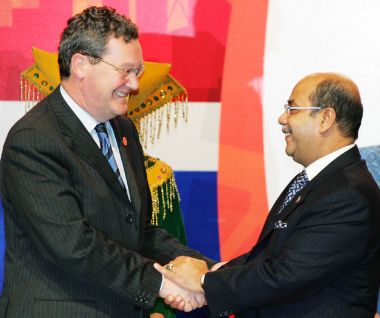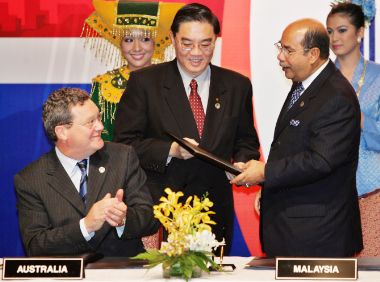|
Australia signs ASEAN friendship pact
(AP)
Updated: 2005-12-10 14:39
Australia signed a friendship treaty with Southeast Asia on Saturday after
years of reluctance, saying it is a small price to pay to ensure binding
economic ties with the region.
Foreign Minister Alexander Downer signed the Treaty of Amity and Cooperation,
a nonaggression pledge with the 10-member Association of Southeast Asian
Nations, at their annual gathering of ministers and leaders.
"We are happy to sign the Treaty of Amity and Cooperation," Downer told
reporters.
Australia had balked at signing the accord since about 15 years ago, when it
started seeking closer ties with ASEAN. Canberra claimed the pact could conflict
with obligations under other treaties, including with the United States,
arousing suspicion in Southeast Asian and curtailing trade relations.

Australia's Minister of Foreign Affairs
Alexander Downer (L) shakes hands with his Malaysian counterpart Syed
Hamid Albar after Australian signed a treaty on amity and cooperation
ahead of the 11th ASEAN Summit, Kuala Lumpur December 10,
2005.[Reuters] | But Australia "negotiated an
understanding with ASEAN countries to the extent that we feel we can sign it
without disrupting relations with countries beyond the region, specifically the
U.S.," Downer said.
Malaysian Foreign Minister Syed Hamid Albar welcomed Australia's decision.
"It shows that geopolitically and geo-economically they want to be part of
this region and to participate and contribute. And we welcome all this, he said.
Australia announced its intention to sign the pact in July after ASEAN made
it a key condition for joining the inaugural East Asia Summit, seen as a
precursor to creating a pan-Asian economic and strategic community.
The summit will be held Wednesday, a day after the ASEAN meetings end.
"In the end, all of the countries of ASEAN wanted Australia to sign the TAC.
By us singing the treaty ... and us in a way, more importantly being part of
East Asia Summit, that it is a quid pro quo that we can live with," Downer said.

Australia's Minister of Foreign Affairs
Alexander Downer (L) applauds as his Malaysian counterpart Syed Hamid
Albar (R) hands over to ASEAN Secretary-General Ong Keng Yong the treaty
document Australia signed on amity and cooperation ahead of the 11th ASEAN
Summit, Kuala Lumpur December 10,
2005.[Reuters] | Earlier this month, Downer had
said that Australia's strong ties with the United States "is an asset that we
bring to the region."
"So we come to the region with a set of strengths _ economic strengths, the
strength of our alliance with the United States. And we come to the region with
goodwill," he said.
Australia has said its desire for closer links with Southeast Asia _
positioned as a bridge to economic powerhouses India and China _ was
instrumental in dropping its objections to the treaty.
Also, Australia wanted to be part of the East Asia Summit as a founding
member and not come on board later when it won't be able to exert as much
influence.
Southeast Asian nations had urged Australia to sign the treaty to dispel
their concerns over Canberra's policy asserting it has the right to
pre-emptively attack terrorists on foreign soil if they pose a threat to
Australia.
Australia announced the policy after suicide bombings on Indonesia's resort
island of Bali that killed 202 people _ 88 of them Australians _ in 2002.
Indonesia and Malaysia at the time called the stance a threat to their
sovereignty.
Australia later insisted that any suggestion that it would invade its
neighbors was "preposterous."
New Zealand signed the amity pact in July. India, China, Japan and South
Korea acceded to it earlier. These six countries and the 10 countries of ASEAN
will form the East Asia Summit.
|